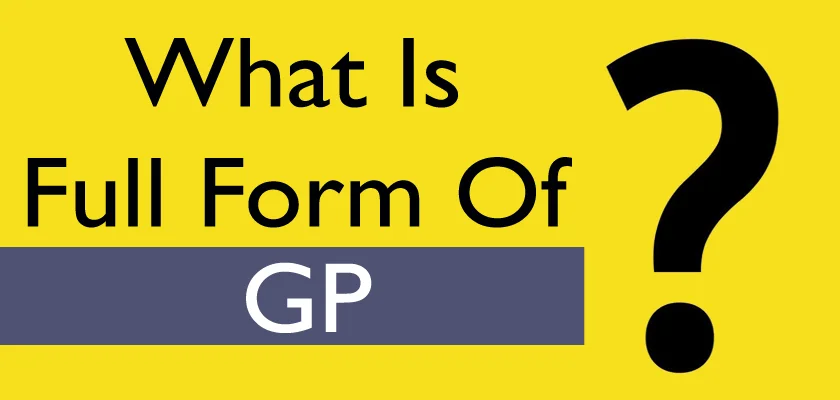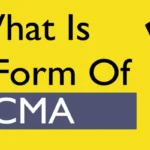Do you know what is the GP Full Form? GP is an abbreviation for Medical. GP Full Form stands for General Practitioner. The GP is an abbreviation with numerous forms and popular meanings. It is “General Practitioner,” “General Partner,” “Gay Pride,” “Grand Prix,” and “General Principle.” Read all the information about the full form of GP here.
The full form of GP is a General Practitioner, which refers to a medical doctor. A General Practitioner cares for patients with minor, acute, and chronic illnesses. A GP refers patients with serious conditions to a specialist doctor or a hospital. They are also known as a family doctor and internist.
Table of Contents
What is the Full Form of GP?
Your overall physical and mental health is traced by the general practitioners to keep you healthy. They play an important role in the healthcare system. Their main focus is to keep you healthy and fit.
What Does a General Practitioner Do?
A general practitioner does multiple vital works, some are the following:
- A general practitioner is the first point of contact for a patient because they treat your overall health, such as mental or physical health. They help everyone from older adults to newborns.
- General practitioner responsibilities include reviewing your medical history and previous diseases and recognizing your health status with a physical exam. After these tests, they may order additional tests, recommend treatment, and refer or connect you with a specialist doctor.
- In an emergency, a general practitioner can provide the necessary treatment to save patients’ lives until help arrives.
- To assist your holistic (whole-body) treatment, general practitioners collaborate with a wider team including nurses, pharmacists, psychiatrists, and others. They are a crucial part of health promotion and preventative medicine. Some examples of the care they provide include:
- Immunizations
- Follow-up care
- Routine exams
- Chronic (long-term) illness care
- Mental health checks
- References to specialists

What are the Educational Requirements for General Practitioners?
To become a general practitioner, you need to fulfill these steps:
- Graduate from high school – The candidate must hold a graduate education from a high school.
- Complete a bachelor’s degree – Candidates must have a bachelor’s degree to become a general practitioner.
- Pass the Medical College Admissions Test – The candidate must pass the Medical College Admissions Test (MCAT) to achieve admission to a medical college and complete the general practitioner course. Your test results might aid in getting you accepted into a highly competitive medical program, along with your formal application, transcripts, letters of recommendation, essays, and resumes.
- Attend medical school – You can achieve a Doctor of Medicine (M.D.) or a Doctor of Osteopathic Medicine (D.O.) to practice as a general practitioner, depending on your chosen medical program.
- Pass required examinations – As part of the United States Medical Licensing Examination (USMLE), medical students must pass three examinations to become General Practitioners. Before being permitted to practice medicine, students must complete all of their exams. The USMLE and the Comprehensive Osteopathic Medical Licensing Examination (COMLEX) are options for students studying for the Doctor of Osteopathic Medicine.
- Complete a residency program – Medical school candidates complete a residency program under the guidance of a general practitioner.
- Get licensed- Before treating patients, general practitioners get a state license. Studying the medical requirements for the area where you intend to practice medicine is a good idea because they may differ by place.
- Become board certified- Many general practitioners decide to pursue family medicine certification. This offers more proof that they are professionals in their field. The American Board of Family Medicine provides this certification, including specified residency requirements and an exam.
Other Most Used GP Full Forms
The GP has many full forms and popular meanings, so here we are giving all those GP full forms below:
| Term | Full Form | Category |
| GP | General Practitioner | Medical |
| GP | General Partnership | Stock Exchange |
| GP | Guadeloupe | Country Names |
| GP | Glue Geode Parameter File | File Type |
| GP | Gofer Project (Haskell Language Dialect) | File Type |
| GP | Gofer Project File | File Type |
| GP | Geode Parameter File (Geoworks) | File Type |
| GP | RAJ GANGPUR | Indian Railway Station |
| GP | Gas Phase | Chemistry |
| GP | Glucose Precursor | Chemistry |
| GP | Group | Messaging |
| GP | General Principle | Messaging |
| GP | Guide Price | Accounts and Finance |
| GP | General Publication | Space Science |
| GP | General Purpose | Space Science |
| GP | Grand Pa | Job Title |
| GP | General Practice | Job Title |
| GP | Grazed Pontiffs | Job Title |
| GP | Guinea Pig | Job Title |
| GP | Governors Pass | Earth Science |
| GP | Gauteng Province | Country Specific |
| GP | Game Pad | Computer Hardware |
| GP | General Physics | Physics Related |
| GP | Grand Prix | Sports |
| GP | Good Practice | Sports |
| GP | Games Played | Sports |
| GP | Game Percentages | Sports |
| GP | Game Player | Sports |
| GP | Girl Pilots | Sports |
| GP | Grand Prize | Sports |
| GP | Guest Pass | Sports |
FAQ: GP Full Form
What does GP stand for?
GP stands for General Practitioner
What does a GP do?
A GP is a medical doctor who provides primary care services to patients of all ages. They offer consultations, diagnose and manage common illnesses and injuries, provide preventative care, and refer patients to specialists when needed.
Is a GP the same as a family doctor?
Yes, in most cases. “GP” and “family doctor” are often used interchangeably.
Do I need a referral to see a GP?
In many countries, including the UK, Australia, and Canada, you typically need a referral from your GP to see a specialist. However, this can vary depending on your healthcare system.
What kind of conditions can a GP treat?
GPs can treat a wide range of common illnesses and injuries, such as:Colds, flu, and other infections
Ear infections, sore throats, and other minor ailments
Skin conditions, allergies, and rashes
Musculoskeletal problems like pain and strains
Diabetes, high blood pressure, and other chronic conditions
Mental health concerns like anxiety and depression
Can a GP prescribe medication?
Yes, GPs can prescribe most types of medication.
What are the benefits of seeing a GP?
Benefits include:Convenient access to primary care
Personalized care from a doctor who knows you and your medical history
Ability to receive preventative care and screenings
Early diagnosis and treatment of health problems
Referral to specialists when needed
How can I find a GP?
You can usually find a GP through your local healthcare system. Many countries have online directories or phone-in services to help you find a doctor near you.
What are the qualifications of a GP?
GPs typically have a medical degree and have completed specialized training in primary care.
How often should I see a GP?
This depends on your individual needs and health status. Your GP can advise you on how often you should schedule checkups.
What happens during a GP appointment?
During an appointment, your GP will discuss your concerns, perform a physical examination if needed, and recommend treatment options.
Thanks for reading. What is the GP Full Form? Bookmark our website Whatisfullform.com to learn more, read our collection of full forms.


